pancreatitis support
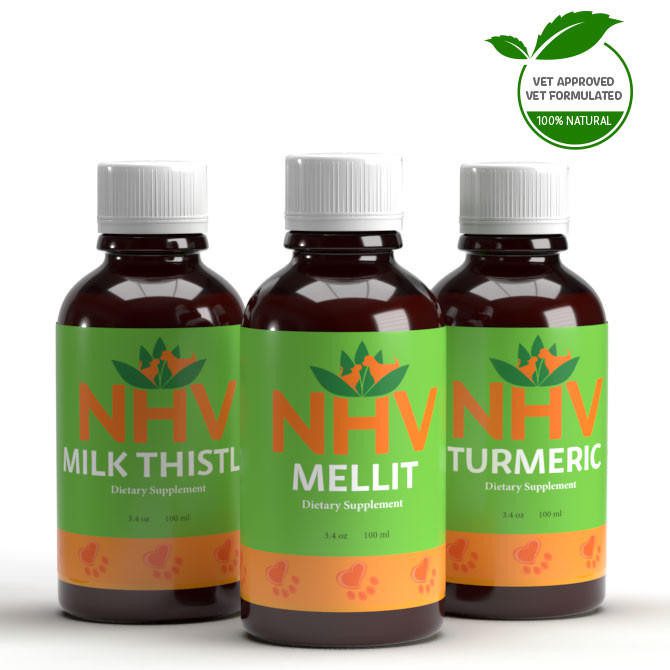
free shipping over $100 (USA & Canada)
1-877-937-4372 the pet expert hotline
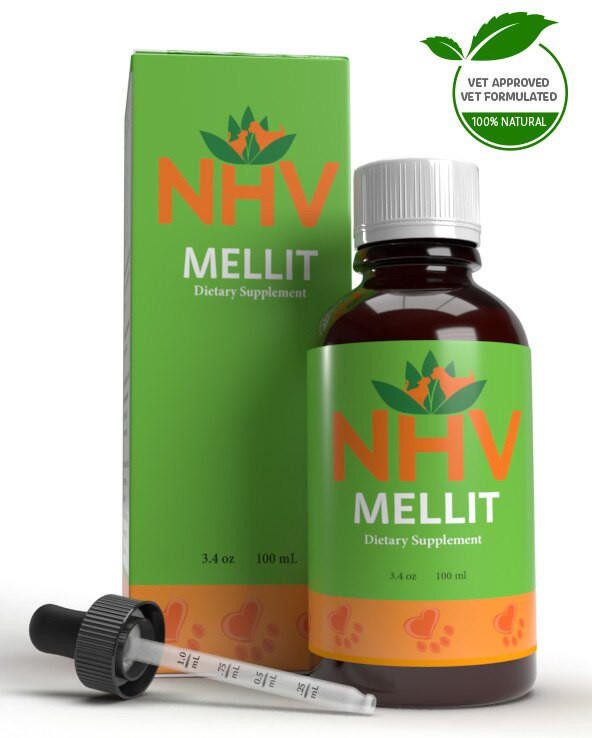
Supports healing of pancreatitis and diabetes mellitus in cats

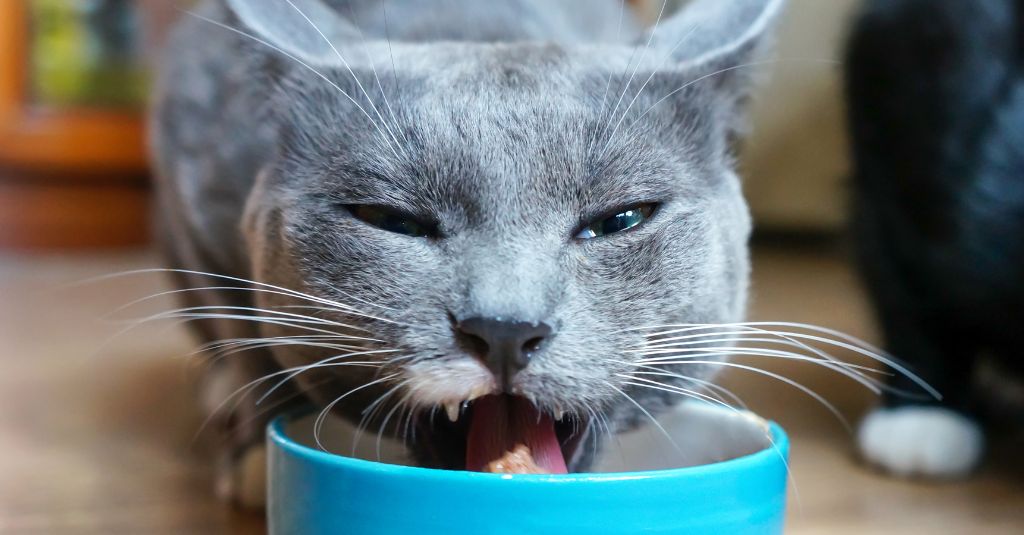
Learning what to feed a cat with pancreatitis is critical to managing this uncomfortable condition. That’s because some enzymes produced in the pancreas are responsible for digesting food, and the organ works twice as much when your little one ingests a high-fat diet. So let’s understand how an overworked pancreas can lead to inflammation and how to avoid it.
Cats need a balanced amount of fat in their daily diet. This nutrient brings many benefits to pets, such as providing energy, healthier fur, and improving the immune system. When considering what to feed a cat with pancreatitis, pet parents should avoid fatty foods in excess.
High-fat food can lead to acute pancreatitis, obesity, heart problems, and increased blood pressure in cats.
An easy way to avoid excess fat is by not offering human food and table scraps. A lot of our meals, such as bacon, fried ingredients, cheese, milk, and highly processed foods, can trigger health problems in pets, including pancreatitis.
Highly processed pet food, like some types of kibbles and treats, can also cause pancreatitis due to its high-fat, low-protein composition. The lack of nutrients in this diet can also impact the pet’s immune system and cause inflammation in other digestive organs, in addition to the pancreas.
These are the main aspects to take into consideration when planning a balanced diet to help prevent pancreatitis:
There are plenty of good commercial diets available for cats suffering from pancreatitis. A homemade diet is also a great way to ensure you have complete control over the nutritional value of everything your furkiddo eats. A qualified professional can help ensure the homecooked meal is balanced and ideal for pets suffering from inflammation in the pancreas.
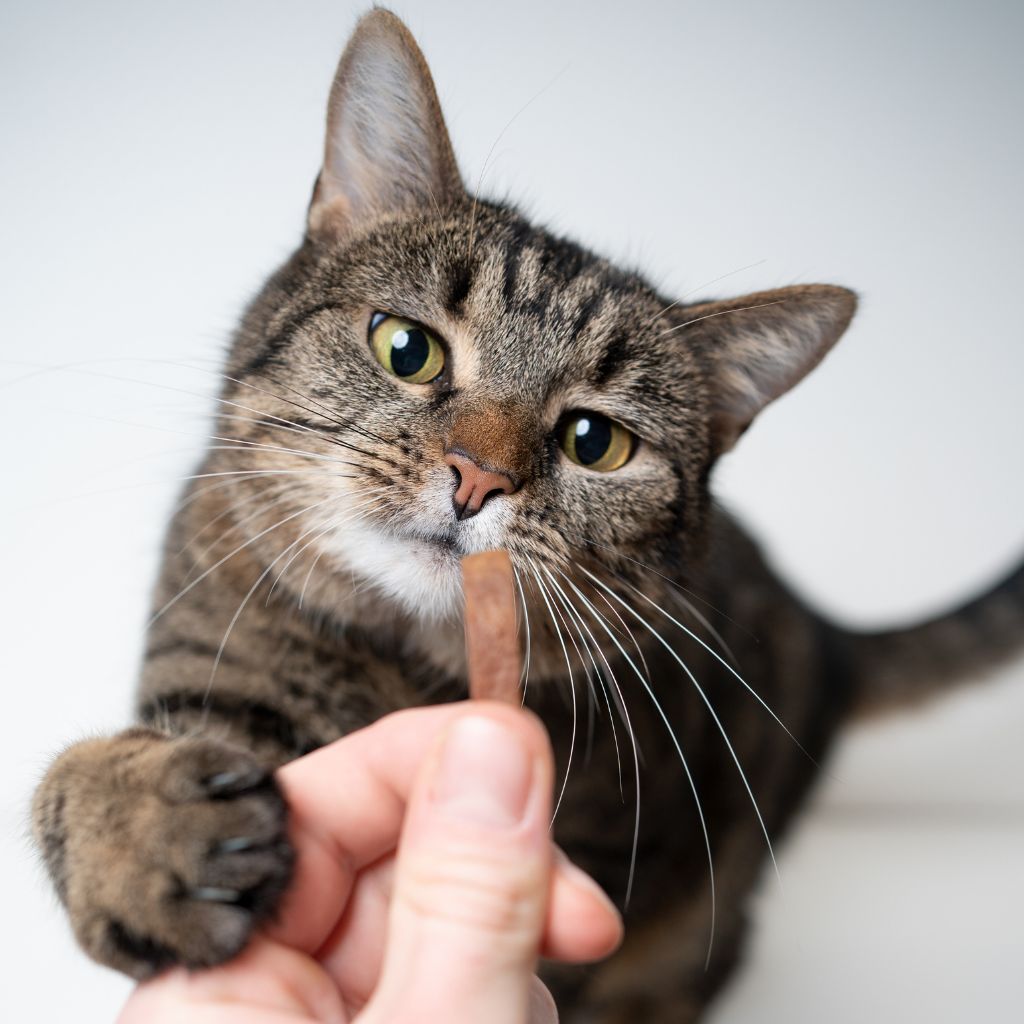
Unfortunately, once a dog or cat has pancreatitis, the chances of recurrence are high. That’s when being proactive and offering life-long support can help avoid future manifestations. Besides a natural and balanced diet, herbal supplements can help manage the condition.
NHV Mellit is our main recommendation for pets with a confirmed diagnosis of pancreatitis. Some ingredients in Mellit, such as Jambolan, blueberries, and dandelion, may help protect the pancreas against oxidation damage, reduce inflammation, and repair the damaged pancreatic tissues.
If you are looking for overall support, we have built a Pancreas Imbalance kit that includes not only Mellit but also NHV Turmeric and NHV Milk Thistle.
Turmeric contains curcumin, a powerful antioxidant that can help reduce inflammation and relieve the symptoms of an inflamed pancreas. As Milk Thistle improves the digestion of fat, it also may be helpful in supporting pancreatic function.
Lastly, cats are very sensitive animals, and stress might flare up the symptoms of pancreatitis. Therefore, adding our stress relief formula, NHV Matricalm, may also be helpful in comforting cats suffering from inflammation in the pancreas.
NHV Mellit is recommended for pets with a confirmed pancreatitis diagnosis. If you suspect your little one might be dealing with pancreatic issues, please visit a vet for a complete check-up. In the meantime, please know that we are here for you! Click the button below to start talking to our team of Pet Experts about your concerns.
pancreatitis support

All-Natural Dog and Cat Pancreatic Support Supplements
bundle and save with pet expert kits
3 month supply for a small to medium size pet
Pancreatitis can cause a lot of discomfort and sleepless nights for your little one. Help your cat or dog bounce back naturally with our pancreatic support kit to ease inflammation, manage blood sugar levels and support healthy liver and kidneys.


Pancreatitis can cause a lot of discomfort and sleepless nights for your little one. Help your cat or dog bounce back naturally with our pancreatic support kit to ease inflammation, manage blood sugar levels and support healthy liver and kidneys.

Pancreatic Support for Dogs and Cats
No one wants to get the news that their sweet four-legged companion is suffering from pancreatitis (inflammation of the pancreas). The pancreas is a squishy, pink gland (that lays to the right of your furkiddo's stomach and is connected to the small intestine) has two main jobs, which are:
1.) To release digestive enzymes to breakdown proteins, carbs and fats (they become active once they reach the small intestine)
2.) To secrete insulin/glucagon to regulate blood sugar levels
Pancreatitis disrupts the normal functioning of digestive enzymes - typically, these enzymes are stored in their inactive form and are only released when needed. When the pancreas is inflamed, enzymes are released and can digest the pancreas itself, leading to severe pain and inflammation. Further inflammation can lead to other diseases like diabetes mellitus (disruption of insulin/glucagon pathways) or inflammation of surrounding tissues (eg. the liver and small intestine). Supporting your pet with cat or dog pancreatic support supplements can help improve their symptoms and put your furry friend back on the path to recovery.
There Are Two Types of Pancreatitis:
Acute Pancreatitis: can happen suddenly, with no previous sign of the condition. It must be treated as quickly as possible and can be life-threatening to other organs if the inflammation spreads.
Chronic Pancreatitis: develops slowly over time and can be a result of repeated attacks of severe pancreatitis.
How NHV Remedies Support Pets With Pancreatitis
It’s difficult to pinpoint the exact cause of pancreatitis. Possible causes could be a high-fat diet (specific to dogs), trauma to the organ (eg. a car accident), certain types of medication, or stress from a chronic illness like hypothyroidism, diabetes mellitus, or inflammatory bowel disease (specific to cats). Symptoms can include lethargy, appetite loss, weakness, abdominal pain, dehydration, vomiting, or diarrhea. To get your furkiddo tested for acute or severe pancreatitis, contact your vet to run some diagnostic tests like a SPEC (specific pancreatic lipase test), ultrasound or a radiograph.
Treatment for pancreatitis often includes intense hydration therapy and supports for pain and nausea. Your little one may require a few sleepovers at the vet so that they can benefit from IV fluids that aid with circulation and encourage the pancreas to heal naturally. NHV’s Pancreas Imbalance Kit 1 is specially formulated to help relieve discomfort, help with inflammation, support the pancreas functioning, as well as support other vital organs like the liver and kidneys. Mellit works to soothe pancreatic inflammation, is beneficial for healthy enzyme function and aids to regulate blood sugar levels. Meanwhile, Milk Thistle, supports the liver and encourages the healthy elimination of toxins, and strengthens immunity. Turmeric contains many effective properties that can soothe discomfort, inflammation and support healthy liver function.
Mellit
Milk Thistle (silymarin)
Turmeric
Use Dog and Cat Pancreas Supplements as Comprehensive Support
Some breeds of dogs and cats may be predisposed to some pancreatic conditions. Dog breeds like Miniature Schnauzers and cat breeds like the Siamese may be prone to pancreatitis. Get in touch with us to figure out how our dog or cat pancreatic supplements can best support your furry friend.
Mellit
Milk Thistle
Turmeric
Select your pet's weight to determine the correct dose.
To be taken twice daily. Determine your pet’s weight and then use the easy chart below to determine the correct dose. This is the minimum dosage.
Pet's Weight Dosage
0 - 15 lb = 0.5 ml
16 - 30 lb = 1.0 ml
31 - 45 lb = 1.5 ml
46 - 60 lb = 2.0 ml
61 - 75 lb = 2.5 ml
Over 75 lb = 3.0 ml
How to Administer
Shake well before use. The easiest method is to use the dropper provided and place the drops into your pet’s food or favorite treat. You can also use the dropper and squirt directly into the pet’s mouth. Some pets can be finicky, if this occurs consider hiding the drops in foods most pet’s love such as fish, chicken or yogurt or a favorite treat. If your pet only eats dry food then soak a few kibbles at feeding time.
For Best Results
Herbal dietary supplements are beneficial to the health and well-being of your pet and are safe for long-term use. Every pet responds to natural herbal supplements differently, therefore it is important to be consistent and administer the product daily. Supplements generally take two to four weeks to take effect, however this will vary from one animal to the next.
Product Storage
All NHV Natural Pet Products are pure herbal extracts and contain no artificial additives, preservatives or coloring. Shelf life after opening is 6 months and must be refrigerated after opening.
Cautions and Contraindications
Do not use in pregnant or nursing animals.
All information provided by NHV Natural Pet Products is for educational purposes only.
Pancreatic Support for Dogs and Cats
No one wants to get the news that their sweet four-legged companion is suffering from pancreatitis (inflammation of the pancreas). The pancreas is a squishy, pink gland (that lays to the right of your furkiddo's stomach and is connected to the small intestine) has two main jobs, which are:
1.) To release digestive enzymes to breakdown proteins, carbs and fats (they become active once they reach the small intestine)
2.) To secrete insulin/glucagon to regulate blood sugar levels
Pancreatitis disrupts the normal functioning of digestive enzymes - typically, these enzymes are stored in their inactive form and are only released when needed. When the pancreas is inflamed, enzymes are released and can digest the pancreas itself, leading to severe pain and inflammation. Further inflammation can lead to other diseases like diabetes mellitus (disruption of insulin/glucagon pathways) or inflammation of surrounding tissues (eg. the liver and small intestine). Supporting your pet with cat or dog pancreatic support supplements can help improve their symptoms and put your furry friend back on the path to recovery.
There Are Two Types of Pancreatitis:
Acute Pancreatitis: can happen suddenly, with no previous sign of the condition. It must be treated as quickly as possible and can be life-threatening to other organs if the inflammation spreads.
Chronic Pancreatitis: develops slowly over time and can be a result of repeated attacks of severe pancreatitis.
How NHV Remedies Support Pets With Pancreatitis
It’s difficult to pinpoint the exact cause of pancreatitis. Possible causes could be a high-fat diet (specific to dogs), trauma to the organ (eg. a car accident), certain types of medication, or stress from a chronic illness like hypothyroidism, diabetes mellitus, or inflammatory bowel disease (specific to cats). Symptoms can include lethargy, appetite loss, weakness, abdominal pain, dehydration, vomiting, or diarrhea. To get your furkiddo tested for acute or severe pancreatitis, contact your vet to run some diagnostic tests like a SPEC (specific pancreatic lipase test), ultrasound or a radiograph.
Treatment for pancreatitis often includes intense hydration therapy and supports for pain and nausea. Your little one may require a few sleepovers at the vet so that they can benefit from IV fluids that aid with circulation and encourage the pancreas to heal naturally. NHV’s Pancreas Imbalance Kit 1 is specially formulated to help relieve discomfort, help with inflammation, support the pancreas functioning, as well as support other vital organs like the liver and kidneys. Mellit works to soothe pancreatic inflammation, is beneficial for healthy enzyme function and aids to regulate blood sugar levels. Meanwhile, Milk Thistle, supports the liver and encourages the healthy elimination of toxins, and strengthens immunity. Turmeric contains many effective properties that can soothe discomfort, inflammation and support healthy liver function.
Mellit
Milk Thistle (silymarin)
Turmeric
Use Dog and Cat Pancreas Supplements as Comprehensive Support
Some breeds of dogs and cats may be predisposed to some pancreatic conditions. Dog breeds like Miniature Schnauzers and cat breeds like the Siamese may be prone to pancreatitis. Get in touch with us to figure out how our dog or cat pancreatic supplements can best support your furry friend.
Mellit
Milk Thistle
Turmeric
Select your pet's weight to determine the correct dose.
To be taken twice daily. Determine your pet’s weight and then use the easy chart below to determine the correct dose. This is the minimum dosage.
Pet's Weight Dosage
0 - 15 lb = 0.5 ml
16 - 30 lb = 1.0 ml
31 - 45 lb = 1.5 ml
46 - 60 lb = 2.0 ml
61 - 75 lb = 2.5 ml
Over 75 lb = 3.0 ml
How to Administer
Shake well before use. The easiest method is to use the dropper provided and place the drops into your pet’s food or favorite treat. You can also use the dropper and squirt directly into the pet’s mouth. Some pets can be finicky, if this occurs consider hiding the drops in foods most pet’s love such as fish, chicken or yogurt or a favorite treat. If your pet only eats dry food then soak a few kibbles at feeding time.
For Best Results
Herbal dietary supplements are beneficial to the health and well-being of your pet and are safe for long-term use. Every pet responds to natural herbal supplements differently, therefore it is important to be consistent and administer the product daily. Supplements generally take two to four weeks to take effect, however this will vary from one animal to the next.
Product Storage
All NHV Natural Pet Products are pure herbal extracts and contain no artificial additives, preservatives or coloring. Shelf life after opening is 6 months and must be refrigerated after opening.
Cautions and Contraindications
Do not use in pregnant or nursing animals.
All information provided by NHV Natural Pet Products is for educational purposes only.
anxiety & aggression support
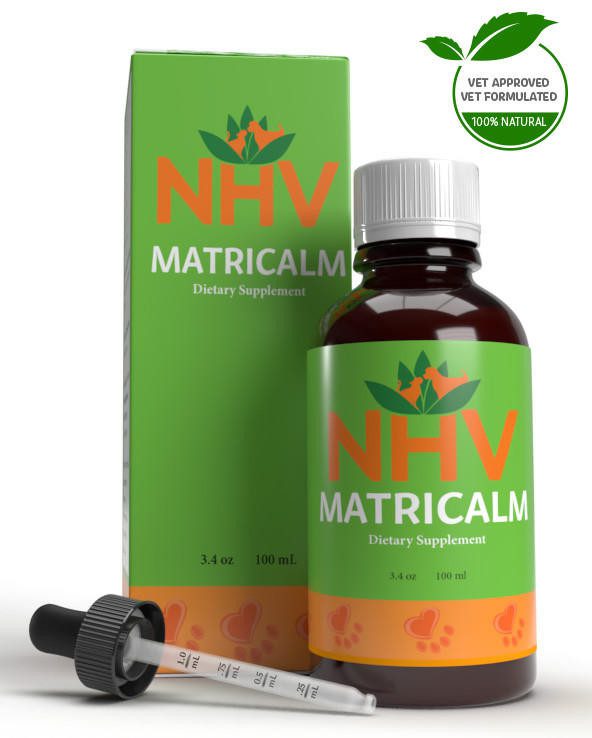
Natural Help for Stress Reduction, Anxiety Relief, Behavioral Problems, and Aggression in Cats
buy 2 and save $3
3 month supply for a small to medium size pet
Matricalm is an all-natural supplement that provides anxiety and stress relief in cats and promotes calm behavior.
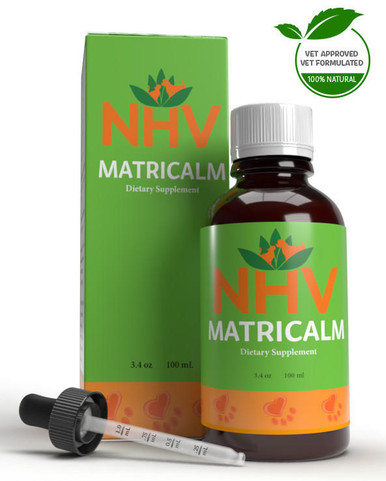
Matricalm is an all-natural supplement that provides anxiety and stress relief in cats and promotes calm behavior.
Help reduce aggressive behavior and provide anxiety and stress relief for your cat with Matricalm, a natural herbal product designed to help reduce excitability in your pet. Cats can become anxious or aggressive when exposed to other animals or to people they are unfamiliar with. When this occurs they may hiss, scratch, howl, or urinate inappropriately.
It’s important to remember that a significant cause of illness in pets results from stress. Helping to keep your cat stress free can help keep them healthier for longer. NHV Pet Experts also often recommend Matricalm for cats dealing with FIV, cancer, kidney issues, hyperthyroidism, and more.
See how NHV Matricalm helped kitty Kimba with yowling and stress.
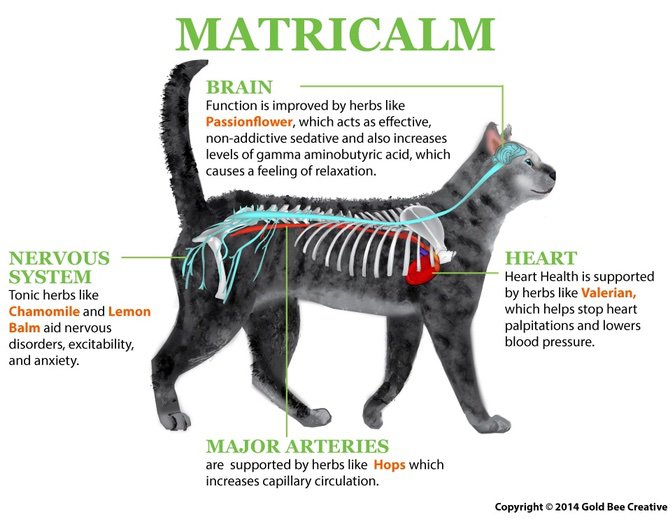
Chamomile – Contains sedative properties. Chamomile also helps the immune system and has a strong affinity for the nervous system.
Passion Flower – An effective, non-addictive sedative. It helps increase gamma-aminobutyric acid (GABA) in the brain, which helps cause a feeling of relaxation. Passion Flower also has strong anti-inflammatory and pain-relieving properties.
Lemon Balm – An aromatic herb used for nervous disorders, excitability, and anxiety. In addition, lemon balm helps lower blood pressure.
Valerian – Helps stop heart palpitations, relaxes spasms, relieves pain, and regulates the nervous system. Valerian also helps improve sleep latency and sleep quality.
Hops – Tension, anxiety, and stress relief in cats. Hops have traditionally been used to help with mood disturbances, such as restlessness and anxiety.
Select your pet's weight to determine the correct dose.
To be taken twice daily. Determine your pet’s weight and then use the easy chart below to determine the correct dose. This is the minimum dosage.
Pet's Weight Dosage
0 - 15 lb = 0.5 ml
16 - 30 lb = 1.0 ml
31 - 45 lb = 1.5 ml
46 - 60 lb = 2.0 ml
61 - 75 lb = 2.5 ml
Over 75 lb = 3.0 ml
How to Administer
Shake well before use. The easiest method is to use the dropper provided and place the drops into your pet’s food or favorite treat. You can also use the dropper and squirt directly into the pet’s mouth.
Some pets can be finicky. If this occurs, consider hiding the drops in foods most pets love, such as fish, chicken, yogurt or a favorite treat. If your pet only eats dry food, then soak a few kibbles at feeding time.
For Best Results
Herbal dietary supplements are beneficial to the health and well-being of your pet and are safe for long-term use. Every pet responds to natural herbal supplements differently. Therefore, it is important to be consistent and administer the product daily. Supplements generally take two to four weeks to take effect; however, this interval will vary from one animal to the next.
Product Storage
All NHV Natural Pet Products are pure herbal extracts and contain no artificial additives, preservatives, or coloring. Shelf life after opening is six months, and it must be refrigerated after opening.
Cautions and Contraindications
Do not use Matricalm for cats as stress relief in pregnant or nursing animals. Speak to your vet before using our products. A second visit is recommended if your pet’s condition does not improve or deteriorates after the continued use of the supplements.
All information provided by NHV Natural Pet Products is for educational purposes only.
Help reduce aggressive behavior and provide anxiety and stress relief for your cat with Matricalm, a natural herbal product designed to help reduce excitability in your pet. Cats can become anxious or aggressive when exposed to other animals or to people they are unfamiliar with. When this occurs they may hiss, scratch, howl, or urinate inappropriately.
It’s important to remember that a significant cause of illness in pets results from stress. Helping to keep your cat stress free can help keep them healthier for longer. NHV Pet Experts also often recommend Matricalm for cats dealing with FIV, cancer, kidney issues, hyperthyroidism, and more.
See how NHV Matricalm helped kitty Kimba with yowling and stress.

Chamomile – Contains sedative properties. Chamomile also helps the immune system and has a strong affinity for the nervous system.
Passion Flower – An effective, non-addictive sedative. It helps increase gamma-aminobutyric acid (GABA) in the brain, which helps cause a feeling of relaxation. Passion Flower also has strong anti-inflammatory and pain-relieving properties.
Lemon Balm – An aromatic herb used for nervous disorders, excitability, and anxiety. In addition, lemon balm helps lower blood pressure.
Valerian – Helps stop heart palpitations, relaxes spasms, relieves pain, and regulates the nervous system. Valerian also helps improve sleep latency and sleep quality.
Hops – Tension, anxiety, and stress relief in cats. Hops have traditionally been used to help with mood disturbances, such as restlessness and anxiety.
Select your pet's weight to determine the correct dose.
To be taken twice daily. Determine your pet’s weight and then use the easy chart below to determine the correct dose. This is the minimum dosage.
Pet's Weight Dosage
0 - 15 lb = 0.5 ml
16 - 30 lb = 1.0 ml
31 - 45 lb = 1.5 ml
46 - 60 lb = 2.0 ml
61 - 75 lb = 2.5 ml
Over 75 lb = 3.0 ml
How to Administer
Shake well before use. The easiest method is to use the dropper provided and place the drops into your pet’s food or favorite treat. You can also use the dropper and squirt directly into the pet’s mouth.
Some pets can be finicky. If this occurs, consider hiding the drops in foods most pets love, such as fish, chicken, yogurt or a favorite treat. If your pet only eats dry food, then soak a few kibbles at feeding time.
For Best Results
Herbal dietary supplements are beneficial to the health and well-being of your pet and are safe for long-term use. Every pet responds to natural herbal supplements differently. Therefore, it is important to be consistent and administer the product daily. Supplements generally take two to four weeks to take effect; however, this interval will vary from one animal to the next.
Product Storage
All NHV Natural Pet Products are pure herbal extracts and contain no artificial additives, preservatives, or coloring. Shelf life after opening is six months, and it must be refrigerated after opening.
Cautions and Contraindications
Do not use Matricalm for cats as stress relief in pregnant or nursing animals. Speak to your vet before using our products. A second visit is recommended if your pet’s condition does not improve or deteriorates after the continued use of the supplements.
All information provided by NHV Natural Pet Products is for educational purposes only.
arthritis support
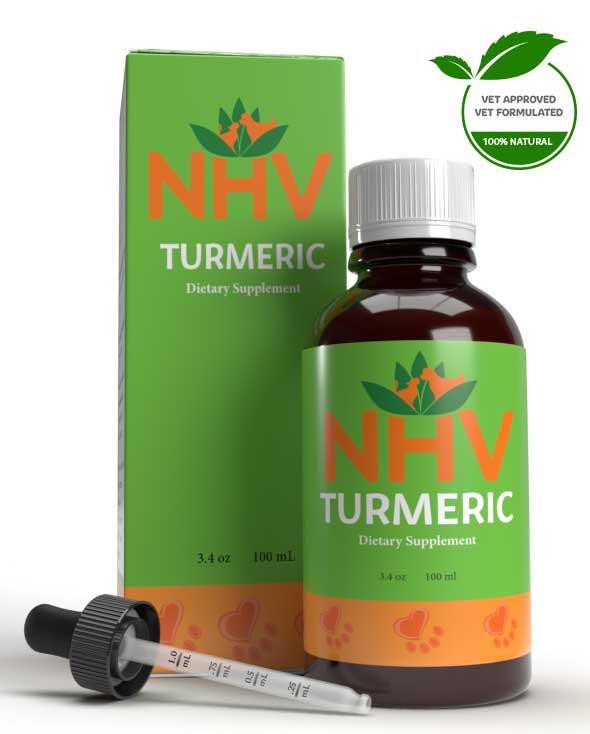
Support for Arthritis and Cancer
buy 2 and save $3
3 month supply for a small to medium size
From their tails to their whiskers, a cat’s body needs to be able to fight whatever comes their way - and not just the toys they like to chase, but health concerns too. NHV Turmeric for cats can be given to your furkiddos for a little extra TLC. This super herb offers support for a variety of conditions like cardiovascular issues, skin health, liver and kidney disease, arthritis, and overall well-being.
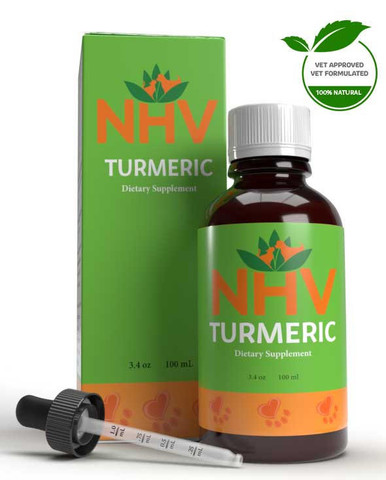
From their tails to their whiskers, a cat’s body needs to be able to fight whatever comes their way - and not just the toys they like to chase, but health concerns too. NHV Turmeric for cats can be given to your furkiddos for a little extra TLC. This super herb offers support for a variety of conditions like cardiovascular issues, skin health, liver and kidney disease, arthritis, and overall well-being.
Want to get your feline friend on a wellness-promoting supplement? Turmeric is an excellent choice - it’s well-tolerated by our whiskered furkiddos, and can offer them many benefits!
What goes into your cat’s body every day will make a difference when it is time to fight a disease, or when they already have one. That’s why NHV supplements are designed to be given each and every day for things like:
It can even be used proactively before your furry friend becomes sick in the first place by giving them a regular boost of natural goodness!
Turmeric itself is a root with vibrant orange-golden flesh. It’s golden in the world of herbalism for pets with its many healing properties.
One of turmeric’s most well-recognized healing properties is its antioxidant content. Antioxidants can help scavenge for free radicals, which are unstable molecules that cause damage to the cells. The free radical scavenging properties of turmeric can support the body in processing and removing these molecules, minimizing the damage they can do.
At NHV, we are experts at harnessing the benefits of herbal ingredients specifically for your pets. When you choose NHV Turmeric, you’re choosing decades of holistic pet wellness experience from vets and herbalists. Our formula is:
We are proud to have been a part of many cats’ success stories over the decades. Check out this feline friend of ours, Willow, who has used our Turmeric for cats formula for comfort and wellness.
Willow’s Story: “I have no doubt that the supplements from NHV have been a huge part in maintaining her health and staving off the cancer that was found in late 2021”
Holistic Veterinarian Approves of Using Turmeric for Cats
Dr. Hillary, a holistic vet, writes an in-depth overview of Turmeric and why she believes turmeric can play a beneficial role in pet health. Read Dr. Hillary’s Turmeric overview here.
All NHV supplements are made with the finest quality organic or ethically harvested herbs. We use non-GMO vegetable glycerin as our base. NHV products are full-spectrum extracts.
Select your pet's weight to determine the correct dose.
To be taken twice daily. Determine your pet’s weight and then use the easy chart below to determine the correct dose. This is the minimum dosage.
Pet's Weight Dosage
0 - 15 lb = 0.5 ml
16 - 30 lb = 1.0 ml
31 - 45 lb = 1.5 ml
46 - 60 lb = 2.0 ml
61 - 75 lb = 2.5 ml
Over 75 lb = 3.0 ml
How to Administer
Shake well before use. The easiest method is to use the dropper provide and places the drops into your pet’s food or favorite treat. You can also use the dropper and squirt directly into the pet’s mouth.
Some pets can be finicky, if this occurs consider hiding the drops in foods most pet’s love such as fish, chicken or yogurt or a favourite treat. If your pet only eats dry food then soak a few kibbles at feeding time.
For Best Results
Herbal dietary supplements are beneficial to the health and wellbeing of your pet and are safe for long-term use. Every pet responds to natural herbal supplements differently, therefore it is important to be consistent and administer the product daily. Supplements generally take two to four weeks to take effect, however this will vary from one animal to the next.
Product Storage
All NHV Natural Pet Products are pure herbal extracts and contain no artificial additives, preservatives or coloring. Shelf life after opening is 6 months and must be refrigerated after opening.
Cautions and Contraindications: Do not use Turmeric in pregnant or nursing animals. Speak to your vet before using our products. A second visit is recommended if your pet’s condition does not improve, or deteriorates after continued use of the supplements.
Want to get your feline friend on a wellness-promoting supplement? Turmeric is an excellent choice - it’s well-tolerated by our whiskered furkiddos, and can offer them many benefits!
What goes into your cat’s body every day will make a difference when it is time to fight a disease, or when they already have one. That’s why NHV supplements are designed to be given each and every day for things like:
It can even be used proactively before your furry friend becomes sick in the first place by giving them a regular boost of natural goodness!
Turmeric itself is a root with vibrant orange-golden flesh. It’s golden in the world of herbalism for pets with its many healing properties.
One of turmeric’s most well-recognized healing properties is its antioxidant content. Antioxidants can help scavenge for free radicals, which are unstable molecules that cause damage to the cells. The free radical scavenging properties of turmeric can support the body in processing and removing these molecules, minimizing the damage they can do.
At NHV, we are experts at harnessing the benefits of herbal ingredients specifically for your pets. When you choose NHV Turmeric, you’re choosing decades of holistic pet wellness experience from vets and herbalists. Our formula is:
We are proud to have been a part of many cats’ success stories over the decades. Check out this feline friend of ours, Willow, who has used our Turmeric for cats formula for comfort and wellness.
Willow’s Story: “I have no doubt that the supplements from NHV have been a huge part in maintaining her health and staving off the cancer that was found in late 2021”
Holistic Veterinarian Approves of Using Turmeric for Cats
Dr. Hillary, a holistic vet, writes an in-depth overview of Turmeric and why she believes turmeric can play a beneficial role in pet health. Read Dr. Hillary’s Turmeric overview here.
All NHV supplements are made with the finest quality organic or ethically harvested herbs. We use non-GMO vegetable glycerin as our base. NHV products are full-spectrum extracts.
Select your pet's weight to determine the correct dose.
To be taken twice daily. Determine your pet’s weight and then use the easy chart below to determine the correct dose. This is the minimum dosage.
Pet's Weight Dosage
0 - 15 lb = 0.5 ml
16 - 30 lb = 1.0 ml
31 - 45 lb = 1.5 ml
46 - 60 lb = 2.0 ml
61 - 75 lb = 2.5 ml
Over 75 lb = 3.0 ml
How to Administer
Shake well before use. The easiest method is to use the dropper provide and places the drops into your pet’s food or favorite treat. You can also use the dropper and squirt directly into the pet’s mouth.
Some pets can be finicky, if this occurs consider hiding the drops in foods most pet’s love such as fish, chicken or yogurt or a favourite treat. If your pet only eats dry food then soak a few kibbles at feeding time.
For Best Results
Herbal dietary supplements are beneficial to the health and wellbeing of your pet and are safe for long-term use. Every pet responds to natural herbal supplements differently, therefore it is important to be consistent and administer the product daily. Supplements generally take two to four weeks to take effect, however this will vary from one animal to the next.
Product Storage
All NHV Natural Pet Products are pure herbal extracts and contain no artificial additives, preservatives or coloring. Shelf life after opening is 6 months and must be refrigerated after opening.
Cautions and Contraindications: Do not use Turmeric in pregnant or nursing animals. Speak to your vet before using our products. A second visit is recommended if your pet’s condition does not improve, or deteriorates after continued use of the supplements.
Published: March 1, 2023